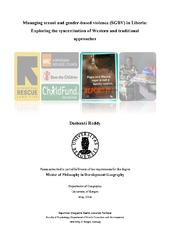Managing sexual and gender-based violence (SGBV) in Liberia: Exploring the syncretisation of Western and traditional approaches
Master thesis
Permanent lenke
https://hdl.handle.net/1956/8439Utgivelsesdato
2014-05-14Metadata
Vis full innførselSamlinger
- Department of Geography [634]
Sammendrag
Background: Sexual and gender based violence (SGBV) is endemic to Liberia. Children are particularly impacted. The health of and justice for those impacted by SGBV are the concern of the government of Liberia (GOL), local and international non-governmental organisations (I/NGOs) as well as local community-based traditional leaders and healers. The state, in close partnership with the international community is in the process of rebuilding its formal health and judicial structures after a devastating 14-year civil war. The traditional Liberian Sande (women) and Poro (men) secret societies are also in the process of reviving traditional culture and traditional medical and judicial practices. Traditional culture and healing played an important role during the civil wars and continue to be deeply rooted in society, especially in the interior. Yet, little research has been undertaken in the extent to which these informal mechanisms cater to SGBV and how and if they interact with Western medical and judicial interventions. Objective: This study aimed to explore the coherence or contention in the relationship between traditional Liberian and Western approaches to treating SGBV, both medically and through jurisdictive methods. Approaches and techniques undertaken by the international community and the traditional Sande society in managing SGBV were explored. Local perceptions of these two structures were sought as well as any endeavours to syncretise the approaches. Methods: This qualitative study followed a phenomenological approach. The study was conducted in two sites: Monrovia and one interior county emphasising the geographic disparity. There were five groups of participants: I/NGOs running programmes supporting survivors of SGBV, government SGBV focus persons, religious and traditional community leaders, girls aged 14-18 years who have experienced SGBV, and traditional healers. Key actors including I/NGO officers, government officials, the Liberian police and the Head of the Liberian Traditional Sande Women's Society were interviewed about programmes that support SGBV survivors, with a particular focus on children. I/NGO programme implementers, local community groups, local leaders, traditional healers and girl survivors of SGBV were interviewed about the impact of the programmes. In-depth semi-structured 30-60 minute interviews, conducted in English were the primary method for data collection. Where possible, a gender balance of participants was sought. Thematic network analysis was used to explore and interpret data. A WHO Ecological Model and Connell's Theory of Gender and Power were used to help analyse the phenomenon. Findings: The few attempts at syncretisation have proved unsuccessful. Government and the funding targets of international donors play a significant role in what is being prioritised, namely western-based medical treatment and psychosocial support. Externally funded programmes to support survivors of SGBV are largely concentrated in Monrovia and nearby counties. At the community level traditional cultural beliefs - regardless of religion - prevail, especially in the interior. The effectiveness of solely western-based initiatives is questionable, considering the impact traditional culture bears on society. Another point of contention is the issue of female genital cutting (FGC). There are a number of underlying factors (war, cultural gendered roles, customary...
